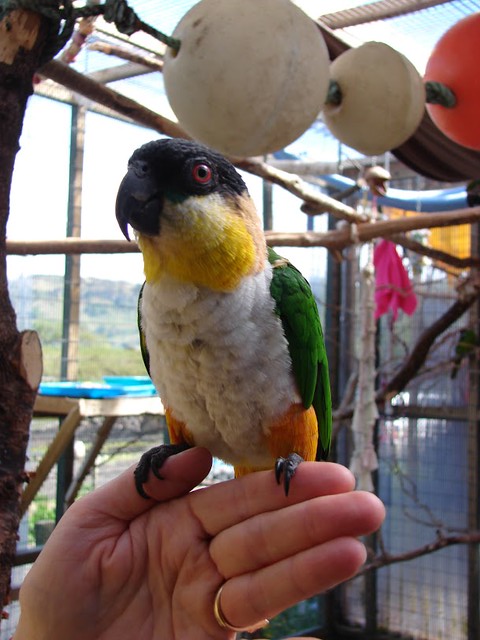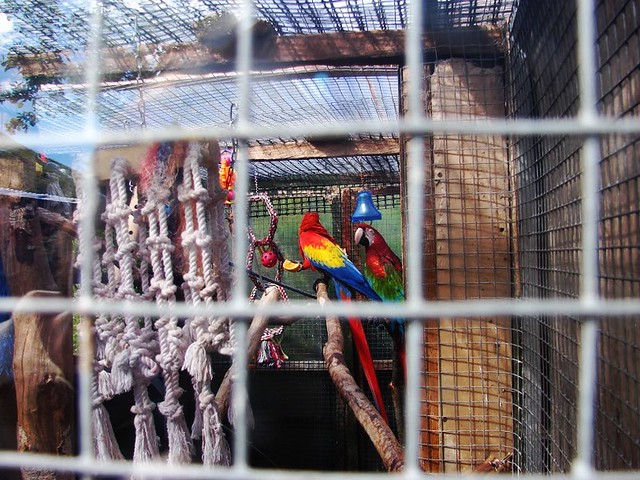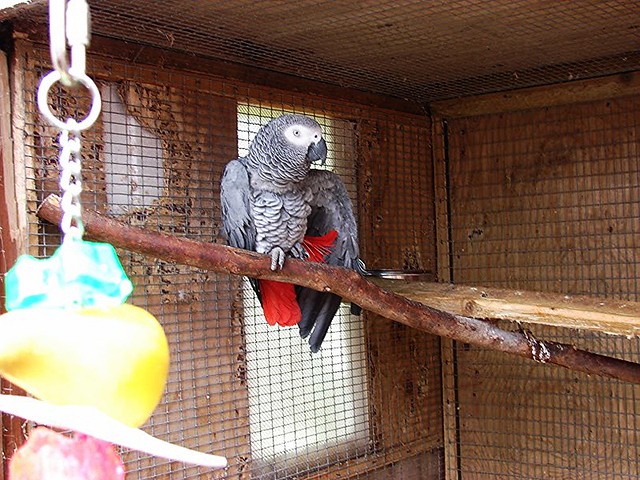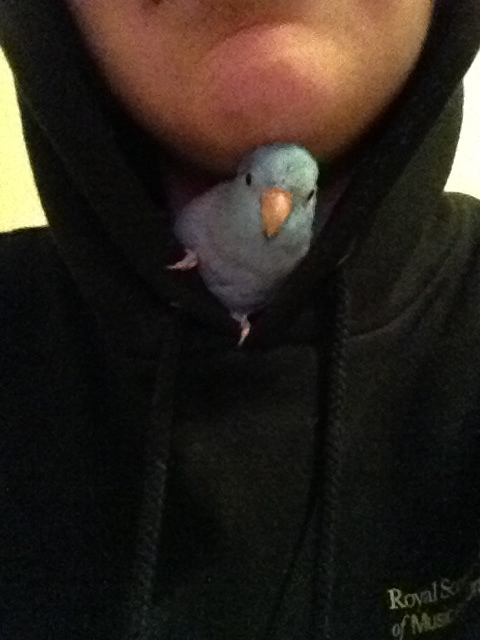The question of when to re-home a bird is an extremely difficult one. It’s not as simple as just giving up the bird to ensure its happiness, because the very act of re-homing will cause the bird emotional trauma.
Here’s how parrots function: When you move them from home to home, they grieve for their people, their flock. It’s not like giving a dog a new home. After a short period of time, a dog will often be overjoyed with attention; they tend to recover much faster emotionally. Parrots are built to function in flocks, and those flocks are like family. They depend on social bonds for security. With each subsequent new home (a parrot has, on average, seven homes in the first five years of its life), it becomes harder for a bird to trust and move on. They remember their past experiences.
When you make the decision to re-home a bird, please, make sure that it is a last-resort on your behalf.
Re-homing is not (always) a failure. Ask yourself the following questions:
- Can this situation be changed, re-worked, or helped with time?
- Is the bird suffering, and if so, can I fix that?
If it is a matter of an aggressive or phobic bird who is not getting what it needs in terms of attention or socialisation, this can be worked on! I would encourage anyone who is thinking of re-homing their pet to give it three to six more months. Training is one thing that takes time to work, so setting yourself a time-limit can actually be detrimental to your goals — but if that’s what it takes for your own sanity, do it. Instigate a short daily training regime, get your bird on a good diet (which can help behavioural issues all by itself), and put in the work required.
I have seen many owners too quick to give up. I have also seen a great deal of families who struggled through a difficult time and trained their bird to become the companion they dreamt of. It’s all down to you.
You may find yourself with a human baby on the way, wondering if you will need to find new homes for your flock. But I know plenty of families who survive in harmony with a flock and children in the same home. Just look at Jamieleigh and Dave! They take safety measures (because parrots and kids can’t just be let loose together and expected to both be happy), and have aviaries so the birds can get vital sunlight and enrichment out of earshot. She has lots of tips on her blog!
Another all-too common situation that may test your sanity: Your bird has suddenly turned on you, choosing another family member after months or years together. (A similar version of this is a bird who turns on the whole family save for yourself, causing serious injury.) Again, training is your solution, which will take time and effort. Training works by creating a positive and engaging interaction between the two of you. It can even be done through the bars of the cage. You can even stop screaming with the right training regime. Plucking is another problem that upsets many owners, and I think that needs to be saved for a post of its own.
There are ways to work through lots of difficult situations. Say, if you find yourself in a financial crisis, there are money-crunching options to help your wallet in the meantime — like making your own toys, or cutting costs in other areas of the home. I’ve had to do this myself. If you find yourself moving, take your flock with you – I imported mine overseas with me, which was a huge amount of work, but SO worth it! If you suddenly have to work late, implement a foraging routine while you’re out, invest in fresh toys, and go straight to interact with your bird until his bedtime when you get home. Getting home really late? Move your birds’ bedtime up, or wake them earlier so that you can spend valuable time together in the mornings.
If you find that your parrot is tearing apart your home because of its behaviour (screaming, biting, or generally being a terror), there are ways that you can temporarily regain your sanity before you tackle the issue. Hire a trusted bird-sitter and take a two-day weekend away, work on training with your bird, mix your routine up. Always persevere. Life with a parrot can be extremely challenging, but your health and well-being are just as important. Without you, your bird has no one.
When to re-home your bird:
- IF a bird does not, cannot, or will not get the attention or care it needs
- A bird is suffering and/or not suited to life in a human household
- You are suffering because your bird is causing you physical or mental anguish, and you have made attempts to remedy this
- You have been working on a situation for several months, and it just isn’t improving
- Other unchangeable circumstances that come up in human lives (such as a forced move, or chronic illness)
Parrot ownership is about sacrifice. You can work through many situations by getting creative and giving it time. Just remember, again, that re-homing isn’t about failure as long as you make it about what’s best for your bird as well as your family.
P.S. If you are thinking about bringing a parrot into your home, please consider adopting. There are thousands of homeless birds who are just as loving and unique as a baby parrot, and not all have ‘issues.’ A good rescue will help you find a perfect match — and guess what? You may well miss out on the worst years of parrot hormones!







30 comments
Our “Whiskey” was at the Melbourne Avian Rescue in Melbourne, Fl. We had checked plastic with three different organizations before arriving for our introduction to “Whiskey” who was hiding beneath a sheet of heavy plastic that was providing shade for another parrot, I looked at him and he looked back at me and when I held my arm up, he came out and slowly stepped up. I talked softly to him as we walked around the large tropical garden. My wife and I spent about an hour with Whiskey" Before we returned him to a perch. We talked with the owner of the rescue for about an hour and she asked if we had ever owned a parrot or had we read any books on the care and challenges of the various birds and of course, our answer was “no” to most of her questions. She advised us to study the subject and she would give us a week to get back to her and return the numerous papers regarding our home and be sure that his cage was adequate, which included a visit to our home to see where he would be located and to determine our ability to care for “Whiskey” I had fallen in love with a little white feathered bird. Two weeks later, “Whiskey” was riding in a small travel cage to our home but before we got out sight of the rescue, he said “I’m Whiskey and I love you” I could no more re-home my “Whiskey” than I could get rid of my son. We’ve faced many challenges but with each one “Whiskey” burrowed a little deeper into our hearts over the past three years. He has his forever home and we’re part of his flock. Whiskey had been in at least four families before he joined ours. He was called a “biter” and that was a sure ticket back to the rescue. When he feel threatened by strangers or someone teasing him, he’ll flare his tail feathers, raise his crown and hunch down to attack mode. But his record of bites in our home have been very few and very light, more of a pinch. He will get into scream mode and we give him a toy or peanuts in the shell, which he doesn’t like and will stop and toss them out of his food bowl, forgetting his screaming. He loves to have his head petted and stroked. A parrot wants to be an active part of the family, not an ornament on a perch.
Where do we find this “training” that is talked about? My 18 year old cockatoo is soooo hormonal that she clings to me like velcro. I have changed out her toys but she doesn’t care. When she is out all she wants to do is her little “hormonal dance” on me. She is an egg layer. I’m trying again to limit her light, I put her in another room at night in a cage to be sure she gets enough sleep. She attacks my husband. I know she thinks I am her mate. I’m so frustrated that I have thought of finding a new home, but after reading this, I don’t want to cause her trauma. I try to make 1.5 hours every evening for her for ‘our time’, then she goes to bed. What should I be doing? What type of training should I try? The vet did recommend some holistic meds to settle her hormones. Waiting for them to come. Please help.
I have been struggling with this decision myself for the last month or so. I took in a rescue Umbrella Cockatoo almost 2 years ago. He is 18 now. I convinced myself that he came from a bad situation and just needed time. The story I had received from the previous owner was that Licorice had bonded with the female of the house and she had passed away from Cancer. His constant screaming for her annoyed the husband and Licorice was locked in a dark closet in an attempt to stop the screaming. He plucked himself almost bald by the time I adopted him. Over the past 2 years, he has gained some feathers back and bonded with myself, but now we have what seems to be an anxiety disorder. If I leave the room, out of sight at all, the screaming starts. I have tried talking to him through the door of his room. He settles for a bit but if he hears me walk away or hears my voice any where in the house, the screaming starts again. My spouse has said he does not scream while I am at work. He wanders around the house looking for me, makes a few noises and goes back to playing with his toys. He is also good once it is dark outside and settles in his cage for the night nicely as long as I cannot be heard in the house, first sign of daylight, he starts screaming for me again. I am battling with the decision whether it is me who is the bad influence for him with too much attention when I am home or if this is a condition we will not get on top of…Any ideas from anyone would be greatly appreciated, as I love him dearly and do not want to look at the option of giving him up but also feel that it cant be healthy for him to be this connected and require my 24 hour attention.
People go out and get a parrot for whatever reason. They don’t don’t do research first so they don’t know what they’re getting into. I go into peeples homes everyday so I see parrots all the time and I always talk to them about their parrots. If they tell me about problems then I tell them about this site. Being a parrot owner they should already know. When I got Cookie 31 years ago there was no net, all I had was a vet and books. Today we have the net but people in a lot of cases just don’t think to use net and give up and get rid of their parrot. Sad. All us parrot owners can do if we get the chance is spread the word about Birdtricks. Since I deal with people I know that theres a lot of people that will not talk about parrot problems so I can’t do anything in those cases. And that people lie. Does it bite? Scream? No no, nothing like that. These problems don’t come with every parrot fof some reason. So I tell people when I can about birdtricks for those who don’t have the common sense just to use the net.
I couldn’t give up my yellow headed Amazon for all the money in the world. We just love him to death no matter how bold he can be but also loveable and talkative. His name is Suey and he is 8 years old.
Leave a comment